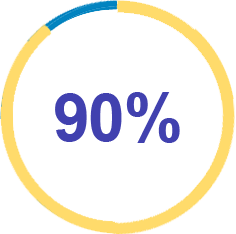AI-Powered Talent Ranking
Score each resume and create a shortlist of top-ranking applications. Process unstructured resumes and job descriptions to help you find the best candidate, always!
Worried you’ll miss out on that perfect candidate?
Are you tired of combing through endless piles of resumes?
As recruiters one of the biggest pain points of the job is having to deal with the mountains of resumes you need to comb though just to find a few good candidates. Worse, having to wrestle with the probability that somewhere in that pile is a perfect candidate whom you miss out on. Or lose to a competitor.
Gabi’s powerful AI backed talent ranking software is designed to help relieve you of this quandary. All you need to do is feed the resumes into the ranking system (it doesn’t matter if you have ten applicants or ten thousand!), lean back, and let Gabi work its magic.
Gabi will identify the best candidates from the pile, assign a score to each, and shortlist the best candidates, for you to peruse at your leisure.

Why do you need talent ranking?
How do you tell a good resume from an unfit one when you have to read through hundreds at a time? With other AI talent management platforms a few keyword matches or a basic similarity in work history might be enough for a resume to get a high rank.
How does Gabi’s Talent Ranking process work?
Gabi’s AI scores resumes based on the role’s requirements and gives each resume a score based on:
Profile match
Job Title Similarity
Skill Strength
-

-

More improvement in recruiter's productivity
-

Increase in new-hire diversity
-
The automated emails system is good feature as it saves time, and we can reach to multiple candidates in short time.
Dr. Reena Shah, Senior Recruiter -
Having all the requisitions, applications, and candidate communications on one easy-to-read page makes my job so much easier.
Ravi Chandra, Technical Recruiter -
Streamlined the process of connecting with candidates and moving them along the hiring process.
Zach Hayes, Technical Recruiter
